Should schools focus on preparing students for real life or for University? Wait…aren’t those the same thing?
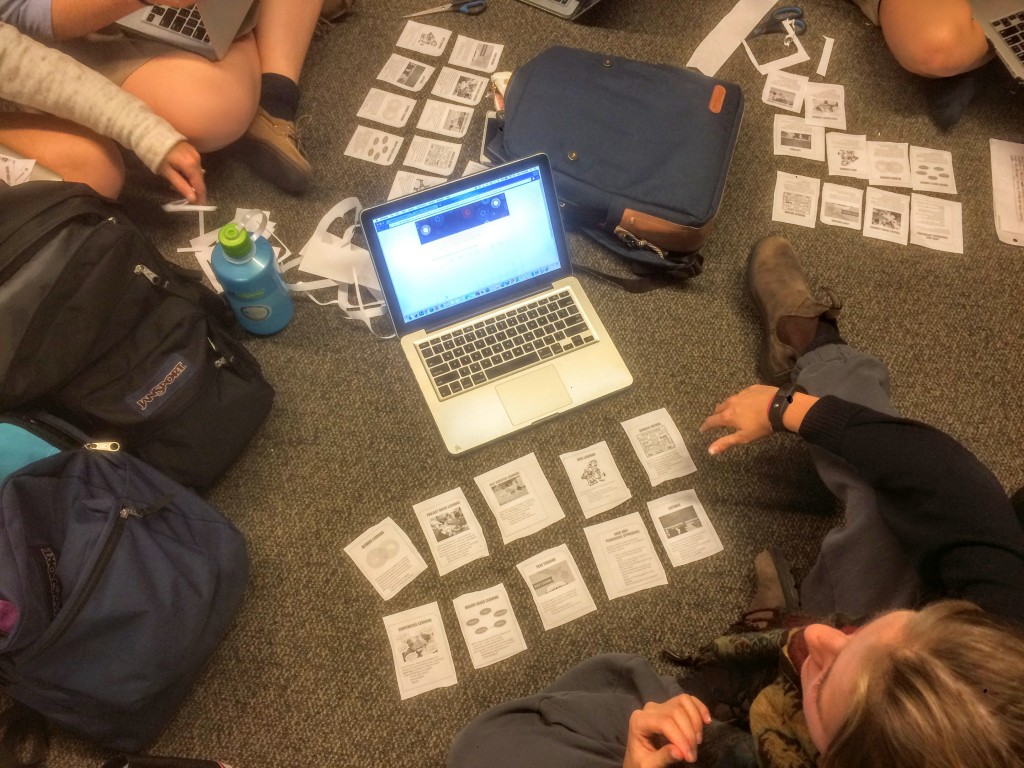
Students completing the card sort activity.
As I explained in my last post, recent conversations with students have led me to question my goal of helping students gain so-called “21st Century Skills” (aka life skills), such as collaboration, adaptability, divergent thinking, creativity, problem solving, innovation and teamwork. As such, I conducted a very informal study with my students, asking them to rank various types of learning activities according to different criteria. They used the cards to sort their ideas and then recorded the results using a Google form so that I could analyze the data. Here are the results.
Analysis
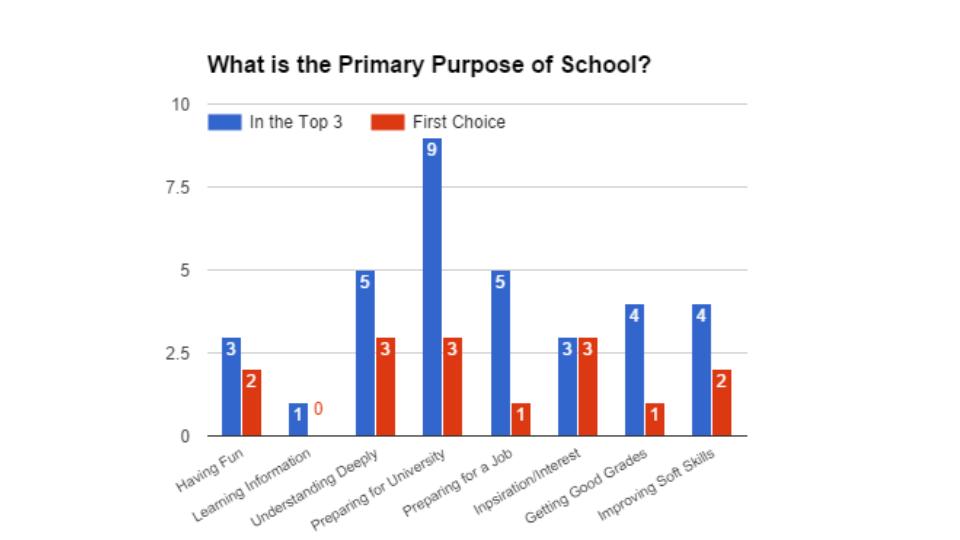
The Purpose of School: I added in the question about the purpose of school during the conversation that I had with the students before they started the activity. I realized that my idea of what I was preparing them for (real life) was different then their idea of what they were being prepared for (postsecondary) and therefore, they had different ideas on what learning activities would be effective.
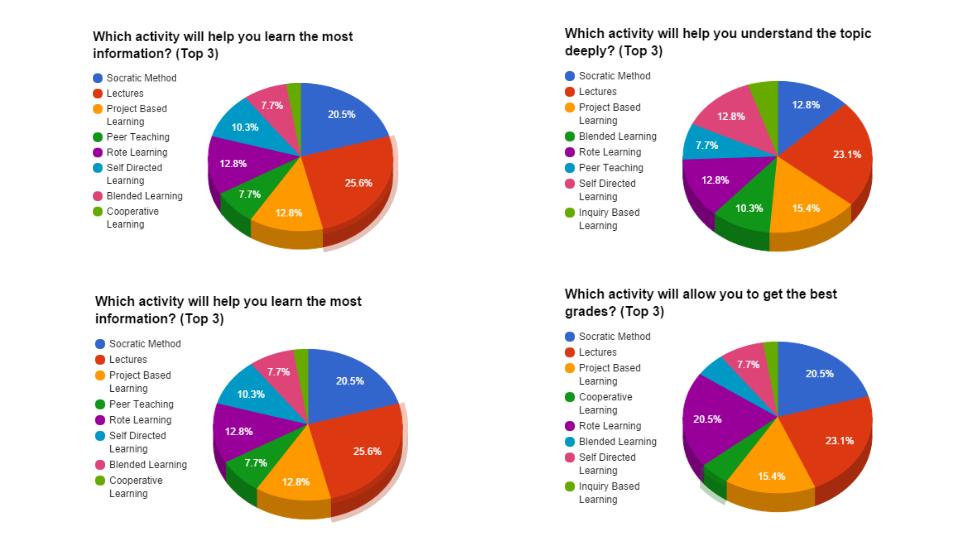
Lectures: It’s no surprise then, that lectures rate high on students’ rankings when it comes to preparing for University, learning the most amount of information, getting the best grades, or learning about topic deeply (though I beg to differ on this one). It’s also clear that the students realize that there is no use for lectures when it comes to preparing for a job (it didn’t even make the list) or improving soft skills. I was surprised to discover that several students found lectures to be “fun” and most suited to their learning style. However, if you look at the results for which is most stressful, you will see that lectures are seen as an unstressful way to learn.
Insight: Students believe that lectures will prepare them for university; but, I wonder if they ranked highly because it is easy for students to sit and passively listen while the teacher does all of the hard work.
It is also interesting to note that Project Based Learning, Inquiry Based Learning and Cooperative Learning barely made the charts on preparing for University and yet they are seen as activities that will best prepare students for a job in the future.
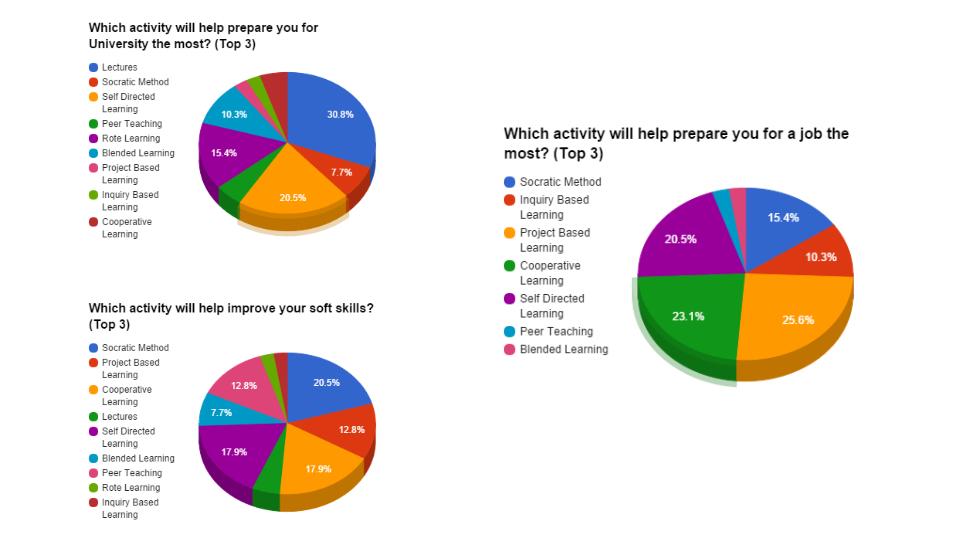
The Purpose of University: This led to a discussion with the students about “What is the purpose of University?” The students in my class said University should teach the knowledge, but that “you’d figure out the rest when you get a job later on.” Yet, I would argue that people often don’t use the knowledge they gained in University so much as the skills they acquire (communication, problem solving, collaboration, etc). We discussed how when Universities were designed long ago, only a very few people went to them, while the rest were in the workforce. University was designed to perpetuate study, research and academia, not to produce people prepared to go into the workforce. Now, a much higher percentage of people are going to University, but Colleges are the places that are teaching skills required for the workforce. All of my students still abide by the belief that you must get a Bachelor’s degree to be successful, but most admitted they know many people who are going to College after University to gain applicable skills.
Insight: I need to do more research into the statistics of employability in relation to education. I believe studies will show that Bachelor’s degrees lead to higher income, but I wonder if that will shift with the continued “academic inflation” that we see today.
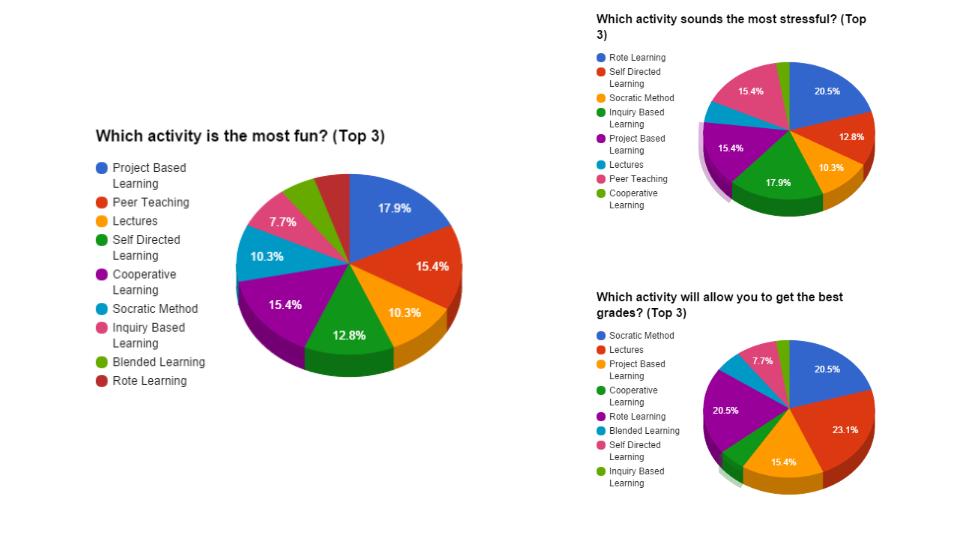
Collaboration: The results indicate that not only do students enjoy working with their peers more than working on their own, but also that activities which require collaboration, teamwork and problem solving are the activities that will best prepare them for the real world. This is part of the reason why I aim to employ cooperative learning structures (ie Kagan) into my classroom, and why I focus so much effort on Project-Based Learning. As Ken Robinson once said, “Collaboration is key to innovation.” However, again we see a disconnect between what the students say they enjoy, or is important, and how they think they learn best, because lectures and rote learning still rate high when asked about how they will get the best grades.
Insight: Maybe the disconnect comes into play because students don’t always see their learning in project-based or inquiry learning. Because no one is telling them the correct answer, they might not actually realize that they are uncovering many right answers along the way. This makes me wonder how I could integrate visible thinking activities with project-based learning.
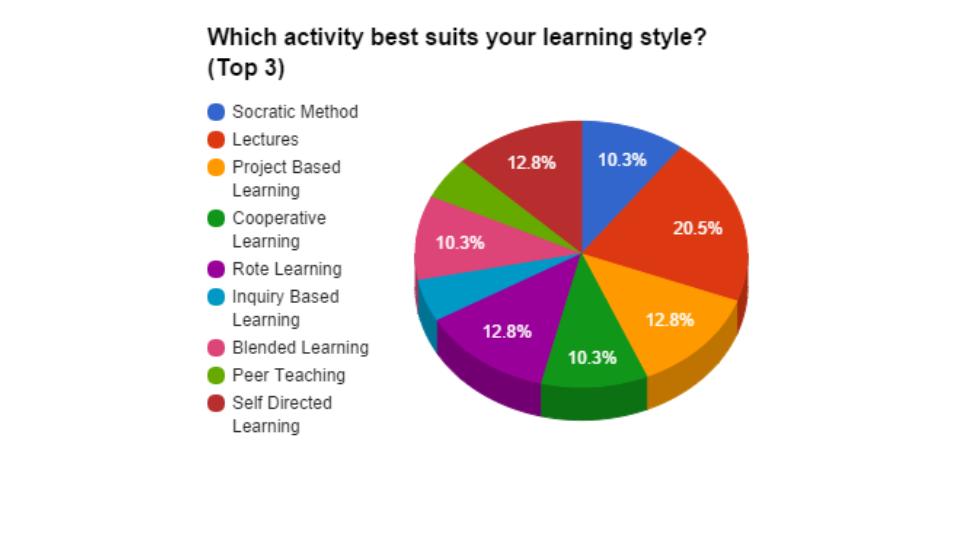
Assessment vs. Learning: After a great conversation with @gnichols I realized that perhaps my research method is slightly flawed. He pointed out that students might think that they prefer lectures; but, if I were to ask them about their preferences for demonstrating what they learned, they might not all be so keen on tests, which are usually associated with lectures or rote learning.
Insight: I need to do further investigation into students’ preferences. I will ask them to do a similar activity, ranking their choices for methods of assessment and evaluation. I hypothesize that students will prefer choice and variety in both the method of assessment (assignments, quizzes, tests, presentations, etc) and in the method of delivery of their understanding (conversations, observations, products). But…who knows, maybe the results will be just as unpredictable!
Further Research: In a recent article on Singularity Hub, the blog for Singularity University, the writers asked some of America’s “smartest” teens how they would redesign school. Their results are slightly different than mine, although their results are more of what I would have hoped my students would indicate.
They found that the top six trends in students responses (they don’t indicate how they collected this data) were:
- Make it about me
- Let’s DO things
- Don’t ditch me in an online course (our results align on this point – Greenwood students also indicate that they don’t like blended learning)
- Be my coach
- Teach me relevant skills
- Foster a growth mindset
I would agree with these students from Singularity Hub, and I wonder why the results from this activity with my students were so different. Clearly I need to spend more time talking with my students to find out how they learn best and what they really want to get out of school.
Insight: More interesting than this article was learning about Singularity University itself. Here is a postsecondary institution that is taking a different approach. Their mission “is to educate, inspire and empower leaders to apply exponential technologies to address humanity’s grand challenges.” They do not offer degrees, but rather present “students” with challenges linked to the real world and attempt to solve them using technology.
Next Steps:
- conduct more research with my students related to their preferences for assessment and evaluation
- learn more about what youth in other places are saying about the future of school
- investigate post secondary institutions that are changing the paradigm of university, such as Singulartiy Hub and Quest University
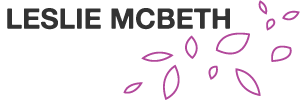
Great stuff, Les! A wonderful read.
To your Assessment v. Learning above: I found that my students who like lectures also do well on tests. And perhaps related: Every time I give a choice for assessment that includes an in-class test option, it’s always the most popular.
I really enjoyed reading this. By including your students in this process, you let them know that their success and engagement is your top priority (and you see the value in listening to them).
It seems you have some great next steps, so I will just forward you one resources that I thought of reading this – Susan Cain’ Book/Ted Talk on introverts (https://www.ted.com/talks/susan_cain_the_power_of_introverts?language=en). Maybe students say they like lectures because it’s a calm and relaxing part of their day where they get to do nothing but listen to an interesting idea and engage with it? That was the case for me, I enjoyed Math lectures in University because I loved Math and in a chaotic day, sometimes it nice to just sit and listen.
I guess the question is, how can we set up projects and collaborative tasks so that they are not overwhelming without sacrificing the rigour and 21st century skill development?
Hi Leslie,
Love how your engaging your students in your thinking process, what a great authentic way to develop an idea. It’s interesting how they chose lectures, I wonder why that is… I wonder how these responses might change depending on how long the students have been out of school. Reflecting back when they are in university, or later in life. I wonder if this survey was done out of school how the results might change?
You’ve inspired me to involve my students in my thinking process about my action plan. Thank you! Loved your post.
This is great Leslie, such a valuable question that I think we are all asking. What if you created lessons based on the different styles that you are asking students about and have them perform a similar exit activity. Do you think they would still prefer the lecture and perform equally between lecture style and project based learning? A thought!